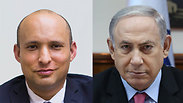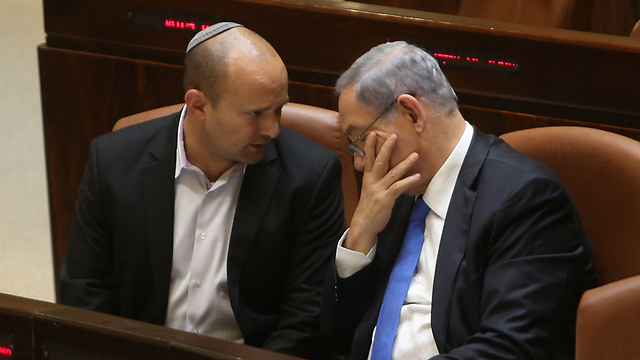
Netanyahu and Bennett’s corrupt deal
Op-ed: An agreement between candidates from rival parties, in which one side promises a senior appointment and the other side promises to keep quiet, is allegedly a bribe agreement. The Likud and Bayit Yehudi leaders went to elections without sharing this agreement with their voters.
Let’s leave the communications research for different times. What concerns me, and should concern many readers, including the attorney general, is one paragraph from an extensive interview with Bayit Yehudi leader Naftali Bennett, which was published in Israel Hayom last Friday. The interviewers were Naama Lanski and Shir Ziv.
According to Bennett, “The prime minister and I agreed ahead of the last elections that he would appoint me defense minister, and that I wouldn’t attack him during the campaign. In the end, he didn’t appoint me defense minister, although I not only avoided attacking him but even embraced him.”

Let’s read the first sentence again: “The prime minister and I agreed ahead of the last elections that he would appoint me defense minister, and that I wouldn’t attack him during the campaign.”
Bennett speaks about it nonchalantly, as if talking about spilled milk or trouble with his boss at work. The truth is, he’s reporting a criminal offense, truly criminal. An agreement between candidates from rival parties, in which one side promises a senior appointment and the other side promises to keep its mouth shut, is allegedly a bribe agreement. It allegedly also violates the law requiring parties to present any coalition agreement to the Knesset. Netanyahu and Bennett went to elections without sharing this agreement with their voters. Netanyahu hid the agreement from then-Defense Minister Moshe Ya’alon, who was presented by the Likud as the defense minister-designate.
After the elections, a frustrated Bennett leaked that there had been an agreement that was violated by Netanyahu. Now, he is admitting it openly, in a direct quote. This is a litigant’s admission. There’s no escape from believing him.
The Penal Law defines five conditions for a bribery offense: (1) A public servant (2) takes (3) or offers a benefit (4) for an act related to his functions (5) in a bid to achieve a result. If Bennett’s version is true, all these components exist in the agreement.
It’s true that neither of them expected to put money in his pocket: One craved votes, the other wanted a ministerial promotion. But the legal authorities address political benefits just as they address material benefits. Mayors and their deputies have been indicted over agreements for political promotions, and so have NGO heads and others. Only recently, the police recommended filing an indictment against Raman Gan Mayor Yisrael Zinger on suspicions of a similar agreement. Moreover, in Case 242, also known as the Yisrael Beytenu affair, two indictments were filed for an agreement that pales into insignificance compared to this agreement. That agreement, with the Ayalim NGO, wasn’t implemented. Nevertheless, the suspects were indicted.
Why does the State Attorney’s Office treat certain politicians a certain way and other politicians differently? I detect two reasons for that. One, the broad public is usually stricter in judging politicians who took bribe money for themselves, but tends to forgive bribery offenses committed for the sake of the party or do not involve cash.
The second reason is the rank. A prime minister can do what a mayor isn’t allowed to do. When it comes to bribery offenses, a prime minister will be prosecuted over cash, and perhaps over gifts purchased with cash, but bribery for political promotion will lead to the prosecution of mayors of small or medium-sized cities at the most.
In my opinion, it’s groundless. Take, for example, the uproar over the investigations against Sara Netanyahu. There’s a lot of uproar because they involve money—not a lot of money, but money nonetheless. Let’s say it is proven she inflated bills. Such an affair should have ended a long time ago, with a fine. She won’t go to prison. At the most, she’ll bring a doctor’s note.
We should be much more concerned by corruption for personal and political promotion. We should be concerned precisely because it involves a prime minister, the leader of a party that seeks to lead the country, and a justice minister as well. I wonder what Ayelet Shaked has to say about this corrupt agreement.










